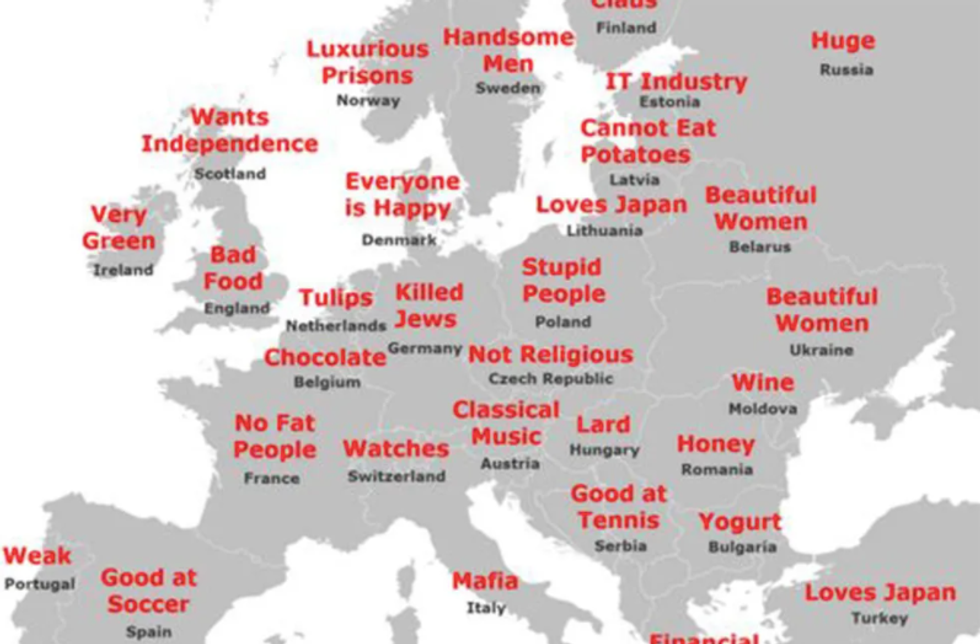Maps of stereotypes have been an internet trope for as long as we can remember.
You've seen London, various topics, and pretty much the whole world.
In 2015, Foreign Policy ran a story on Chinese stereotypes using the search engine Baidu's auto-complete function.
It showed that the overriding presumptions about Britain, at least according to the search engine, were that we are bald, we have a preoccupation about the weather and we don't like talking about the Opium War.
Nick Kapur, a professor of Japanese and East Asian history at Rutgers University, in New Jersey, decided to replicate the methodology to see what the Japanese version would throw up.
Kapur told indy100:
"At first I was just googling on https://google.co.jp to see what would come up and wasn't even really planning on making a map. Originally I was just curious to see what the Japanese autocomplete results would be like. But then so many of the results turned out to be so interesting, that I felt like I had to share these findings somehow."
The result was the map below, made with an image editor, which was retweeted and liked thousands of times.

Sign up to our new free Indy100 weekly newsletter
Kapur added: "The findings I was surprised by were the findings in southeastern Europe (lard, honey, wine, and yoghurt) - I think these are the ones that were most surprising to other people as well, even many people from those actual countries!"
But funnily enough, autocomplete actually knew a little more than we did, as a brief bit of research will show:
"Hungary is known somewhat for using lard, and Romania is actually the second-largest exporter of honey in the EU (with Japan being one of its biggest customers), and that one of the most common brands of yoghurt in Japan is 'Bulgaria Yogurt'.
"The Japanese company that produces it actually licenses the name "Bulgaria" from the country of Bulgaria and promotes Bulgaria as the "birthplace of yoghurt".
Kapur also said that Sweden's result being "handsome men" was something of a curveball:
"In the West, I feel like our stereotype about Sweden revolves around the women being beautiful with little said about the men."
However, Kapur does have a few reservations about the process, and as to whether it is a genuine indicator of stereotypes:
"In this case, I think 'stereotype' is an imperfect term for what we are looking at here. The data you get out of auto complete is messy and also you have to guess at the motivation of the anonymous searchers. Are these people men or women? Do they really hold these views or are they maybe just curious about why other people might possibly hold these views? It's really hard to know."
In addition, by pairing the name of the country with the word "why", it's sometimes a good indicator of stereotypes because the query is searching for the explanation for an assumption the person searching has made - but it's not the only reason people use "why".
"'Why' might also just indicate confusion or uncertainty. For example, the Latvia 'cannot eat potatoes' result turned out to be a 'polandball' joke and so all the Twitter commenters asking me 'why can't Latvians eat potatoes?' were actually doing the same thing the Japanese searchers were doing - this was not anyone's stereotype, but rather just a joke that people didn't get."
The reception to the map, Nick Kapur says, has been very positive:
"I've been surprised at how positive the response has been. Especially since some of these terms are not so complimentary.
But most people have found the map as a whole very interesting, and have taken it in the spirit I intended - which is basically: this is just lighthearted fun and it's only autocomplete, after all, so we shouldn't take this too seriously.
"Some countries also did not have to autocomplete results in Japanese, like Croatia, Albania and Slovakia, while others simply had no terms other than those related to tourism or questions about their flags, or other factual queries."
It's not a perfect exercise, but it is a very interesting read indeed over your awful English breakfast.
Have your say in our news democracy. Click the upvote icon at the top of the page to help raise this article through the indy100 rankings.














